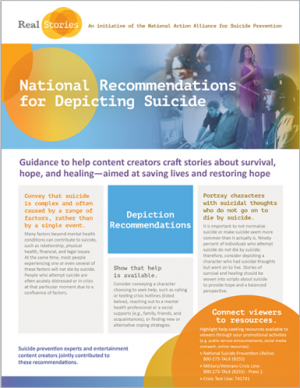Studies have shown that both news reports and fictional accounts of suicide in movies and television can lead to increases in suicide. In contrast, when depictions are done responsibly, the media can help to encourage help seeking, dispel myths, and reinforce hope – and ultimately save lives.
National Recommendations for Depicting Suicide
Goal four of the 2012 National Strategy for Suicide Prevention called for promoting "accurate portrayals of suicide and mental illnesses in the entertainment industry" and "encouraging and recognizing members of the entertainment industry who follow recommendations regarding the accurate and responsible portrayals of suicide and other related behaviors."
To assist the industry in advancing this important goal, the Action Alliance, in collaboration with the Substance Abuse and Mental Health Services Administration (SAMHSA) and the Entertainment Industries Council, developed the National Recommendations for Depicting Suicide in 2019.
The recommendations, which were informed by both representatives from the entertainment industry and the suicide prevention field, aim to help members of the entertainment industry - content creators, scriptwriters, producers - tell more balanced and authentic stories involving suicide and suicide prevention.
The National Recommendations for Depicting Suicide include:
Convey that suicide is complex and often caused by a range of factors, rather than by a single event.
Show that help is available.
Portray characters with suicidal thoughts who do not go on to die by suicide.
Portray everyday characters who can be a lifeline.
Depiction Recommendations
Avoid showing or describing the details about suicide methods.
Consult with suicide prevention messaging experts and people with personal experience.
Depict the grieving and healing process of people who lose someone to suicide.
Use nonjudgmental language.
National Partner Involvement
- American Association of Suicidology
- American Foundation for Suicide Prevention
- American Psychiatric Association
- Education Development Center
- Entertainment Industries Council
- The Carter Center
- National Action Alliance for Suicide Prevention
- National Institute of Mental Health
- National Suicide Prevention Lifeline
- Reingold
- Substance Abuse and Mental Health Services Administration
- Suicide Prevention Resource Center
- The Flournoy Group
- The Jed Foundation
- Tragedy Assistance Program for Survivors
- U.S. Department of Defense
- U.S. Department of Health and Human Services
- U.S. Department of Veterans Affairs
